Leadership and Emotional Intelligence: A Discussion Board Response
VerifiedAdded on 2022/09/30
|6
|1607
|21
Discussion Board Post
AI Summary
This assignment comprises a student's responses to an Independent Learning Task (ILT) and peer replies within a communication and leadership course. The ILT focuses on self-assessment of emotional intelligence traits, referencing Dwyer's text and table 4.1. The student provides a self-rating and justification for each trait, incorporating personal experiences and insights. The assignment also includes responses to two peer posts, building on their ideas and incorporating research to support the arguments. The student's responses reflect critical thinking and engagement with peers, demonstrating an understanding of emotional intelligence and its application in leadership contexts, with supporting references from academic sources, including Dwyer, Ferreira, Regan, and Shunk.
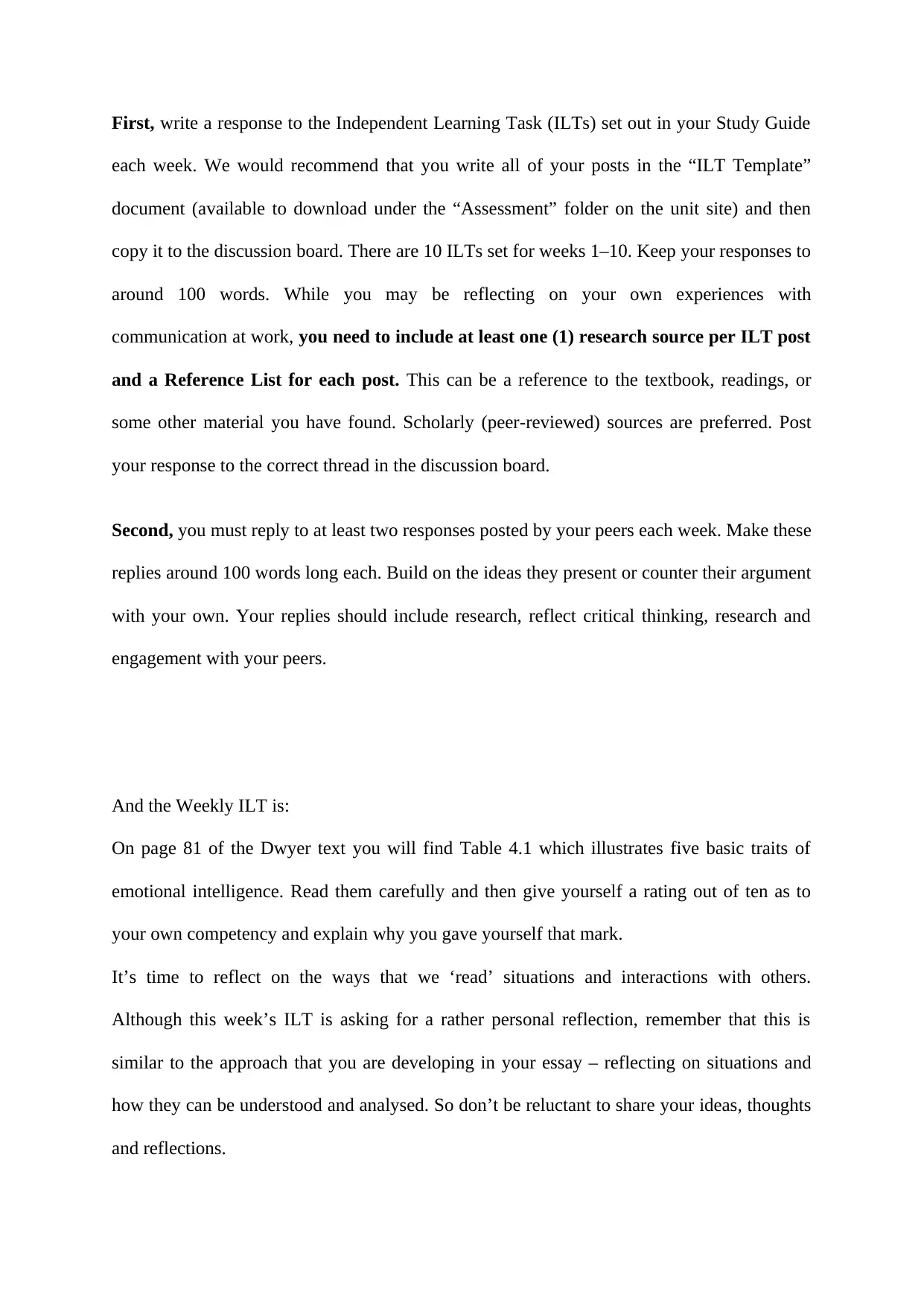
First, write a response to the Independent Learning Task (ILTs) set out in your Study Guide
each week. We would recommend that you write all of your posts in the “ILT Template”
document (available to download under the “Assessment” folder on the unit site) and then
copy it to the discussion board. There are 10 ILTs set for weeks 1–10. Keep your responses to
around 100 words. While you may be reflecting on your own experiences with
communication at work, you need to include at least one (1) research source per ILT post
and a Reference List for each post. This can be a reference to the textbook, readings, or
some other material you have found. Scholarly (peer-reviewed) sources are preferred. Post
your response to the correct thread in the discussion board.
Second, you must reply to at least two responses posted by your peers each week. Make these
replies around 100 words long each. Build on the ideas they present or counter their argument
with your own. Your replies should include research, reflect critical thinking, research and
engagement with your peers.
And the Weekly ILT is:
On page 81 of the Dwyer text you will find Table 4.1 which illustrates five basic traits of
emotional intelligence. Read them carefully and then give yourself a rating out of ten as to
your own competency and explain why you gave yourself that mark.
It’s time to reflect on the ways that we ‘read’ situations and interactions with others.
Although this week’s ILT is asking for a rather personal reflection, remember that this is
similar to the approach that you are developing in your essay – reflecting on situations and
how they can be understood and analysed. So don’t be reluctant to share your ideas, thoughts
and reflections.
each week. We would recommend that you write all of your posts in the “ILT Template”
document (available to download under the “Assessment” folder on the unit site) and then
copy it to the discussion board. There are 10 ILTs set for weeks 1–10. Keep your responses to
around 100 words. While you may be reflecting on your own experiences with
communication at work, you need to include at least one (1) research source per ILT post
and a Reference List for each post. This can be a reference to the textbook, readings, or
some other material you have found. Scholarly (peer-reviewed) sources are preferred. Post
your response to the correct thread in the discussion board.
Second, you must reply to at least two responses posted by your peers each week. Make these
replies around 100 words long each. Build on the ideas they present or counter their argument
with your own. Your replies should include research, reflect critical thinking, research and
engagement with your peers.
And the Weekly ILT is:
On page 81 of the Dwyer text you will find Table 4.1 which illustrates five basic traits of
emotional intelligence. Read them carefully and then give yourself a rating out of ten as to
your own competency and explain why you gave yourself that mark.
It’s time to reflect on the ways that we ‘read’ situations and interactions with others.
Although this week’s ILT is asking for a rather personal reflection, remember that this is
similar to the approach that you are developing in your essay – reflecting on situations and
how they can be understood and analysed. So don’t be reluctant to share your ideas, thoughts
and reflections.
Paraphrase This Document
Need a fresh take? Get an instant paraphrase of this document with our AI Paraphraser
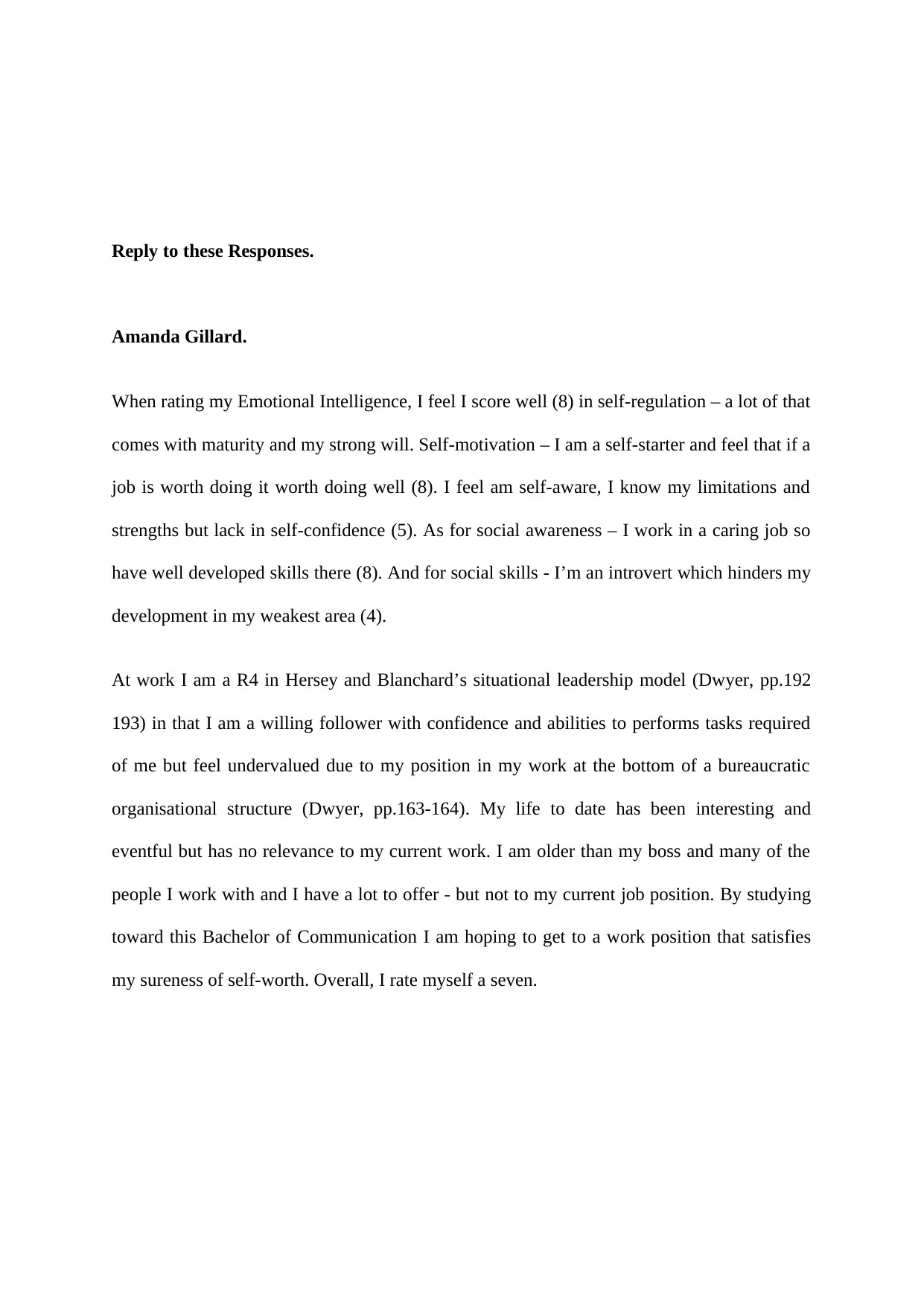
Reply to these Responses.
Amanda Gillard.
When rating my Emotional Intelligence, I feel I score well (8) in self-regulation – a lot of that
comes with maturity and my strong will. Self-motivation – I am a self-starter and feel that if a
job is worth doing it worth doing well (8). I feel am self-aware, I know my limitations and
strengths but lack in self-confidence (5). As for social awareness – I work in a caring job so
have well developed skills there (8). And for social skills - I’m an introvert which hinders my
development in my weakest area (4).
At work I am a R4 in Hersey and Blanchard’s situational leadership model (Dwyer, pp.192
193) in that I am a willing follower with confidence and abilities to performs tasks required
of me but feel undervalued due to my position in my work at the bottom of a bureaucratic
organisational structure (Dwyer, pp.163-164). My life to date has been interesting and
eventful but has no relevance to my current work. I am older than my boss and many of the
people I work with and I have a lot to offer - but not to my current job position. By studying
toward this Bachelor of Communication I am hoping to get to a work position that satisfies
my sureness of self-worth. Overall, I rate myself a seven.
Amanda Gillard.
When rating my Emotional Intelligence, I feel I score well (8) in self-regulation – a lot of that
comes with maturity and my strong will. Self-motivation – I am a self-starter and feel that if a
job is worth doing it worth doing well (8). I feel am self-aware, I know my limitations and
strengths but lack in self-confidence (5). As for social awareness – I work in a caring job so
have well developed skills there (8). And for social skills - I’m an introvert which hinders my
development in my weakest area (4).
At work I am a R4 in Hersey and Blanchard’s situational leadership model (Dwyer, pp.192
193) in that I am a willing follower with confidence and abilities to performs tasks required
of me but feel undervalued due to my position in my work at the bottom of a bureaucratic
organisational structure (Dwyer, pp.163-164). My life to date has been interesting and
eventful but has no relevance to my current work. I am older than my boss and many of the
people I work with and I have a lot to offer - but not to my current job position. By studying
toward this Bachelor of Communication I am hoping to get to a work position that satisfies
my sureness of self-worth. Overall, I rate myself a seven.
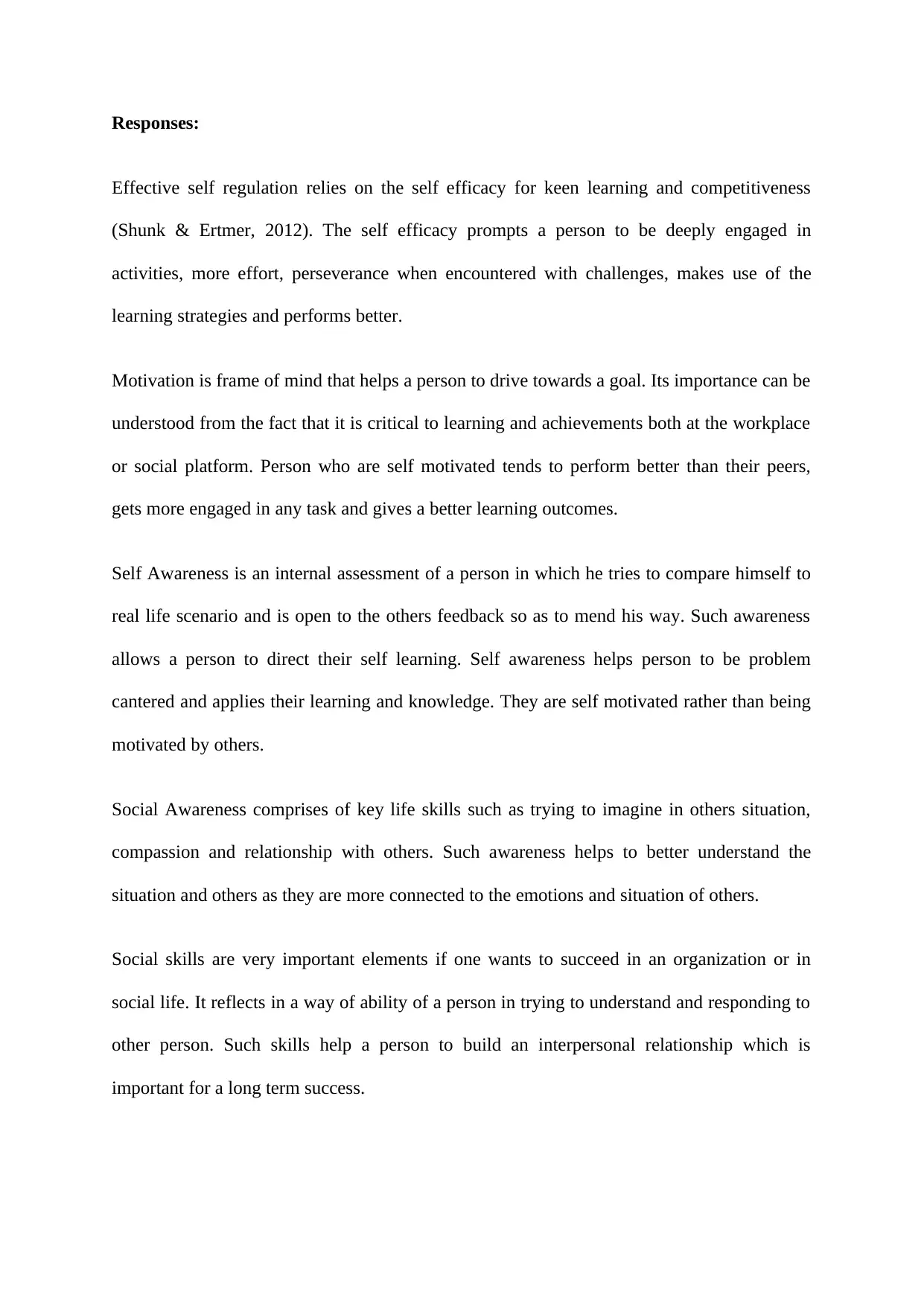
Responses:
Effective self regulation relies on the self efficacy for keen learning and competitiveness
(Shunk & Ertmer, 2012). The self efficacy prompts a person to be deeply engaged in
activities, more effort, perseverance when encountered with challenges, makes use of the
learning strategies and performs better.
Motivation is frame of mind that helps a person to drive towards a goal. Its importance can be
understood from the fact that it is critical to learning and achievements both at the workplace
or social platform. Person who are self motivated tends to perform better than their peers,
gets more engaged in any task and gives a better learning outcomes.
Self Awareness is an internal assessment of a person in which he tries to compare himself to
real life scenario and is open to the others feedback so as to mend his way. Such awareness
allows a person to direct their self learning. Self awareness helps person to be problem
cantered and applies their learning and knowledge. They are self motivated rather than being
motivated by others.
Social Awareness comprises of key life skills such as trying to imagine in others situation,
compassion and relationship with others. Such awareness helps to better understand the
situation and others as they are more connected to the emotions and situation of others.
Social skills are very important elements if one wants to succeed in an organization or in
social life. It reflects in a way of ability of a person in trying to understand and responding to
other person. Such skills help a person to build an interpersonal relationship which is
important for a long term success.
Effective self regulation relies on the self efficacy for keen learning and competitiveness
(Shunk & Ertmer, 2012). The self efficacy prompts a person to be deeply engaged in
activities, more effort, perseverance when encountered with challenges, makes use of the
learning strategies and performs better.
Motivation is frame of mind that helps a person to drive towards a goal. Its importance can be
understood from the fact that it is critical to learning and achievements both at the workplace
or social platform. Person who are self motivated tends to perform better than their peers,
gets more engaged in any task and gives a better learning outcomes.
Self Awareness is an internal assessment of a person in which he tries to compare himself to
real life scenario and is open to the others feedback so as to mend his way. Such awareness
allows a person to direct their self learning. Self awareness helps person to be problem
cantered and applies their learning and knowledge. They are self motivated rather than being
motivated by others.
Social Awareness comprises of key life skills such as trying to imagine in others situation,
compassion and relationship with others. Such awareness helps to better understand the
situation and others as they are more connected to the emotions and situation of others.
Social skills are very important elements if one wants to succeed in an organization or in
social life. It reflects in a way of ability of a person in trying to understand and responding to
other person. Such skills help a person to build an interpersonal relationship which is
important for a long term success.
You're viewing a preview
Unlock full access by subscribing today!
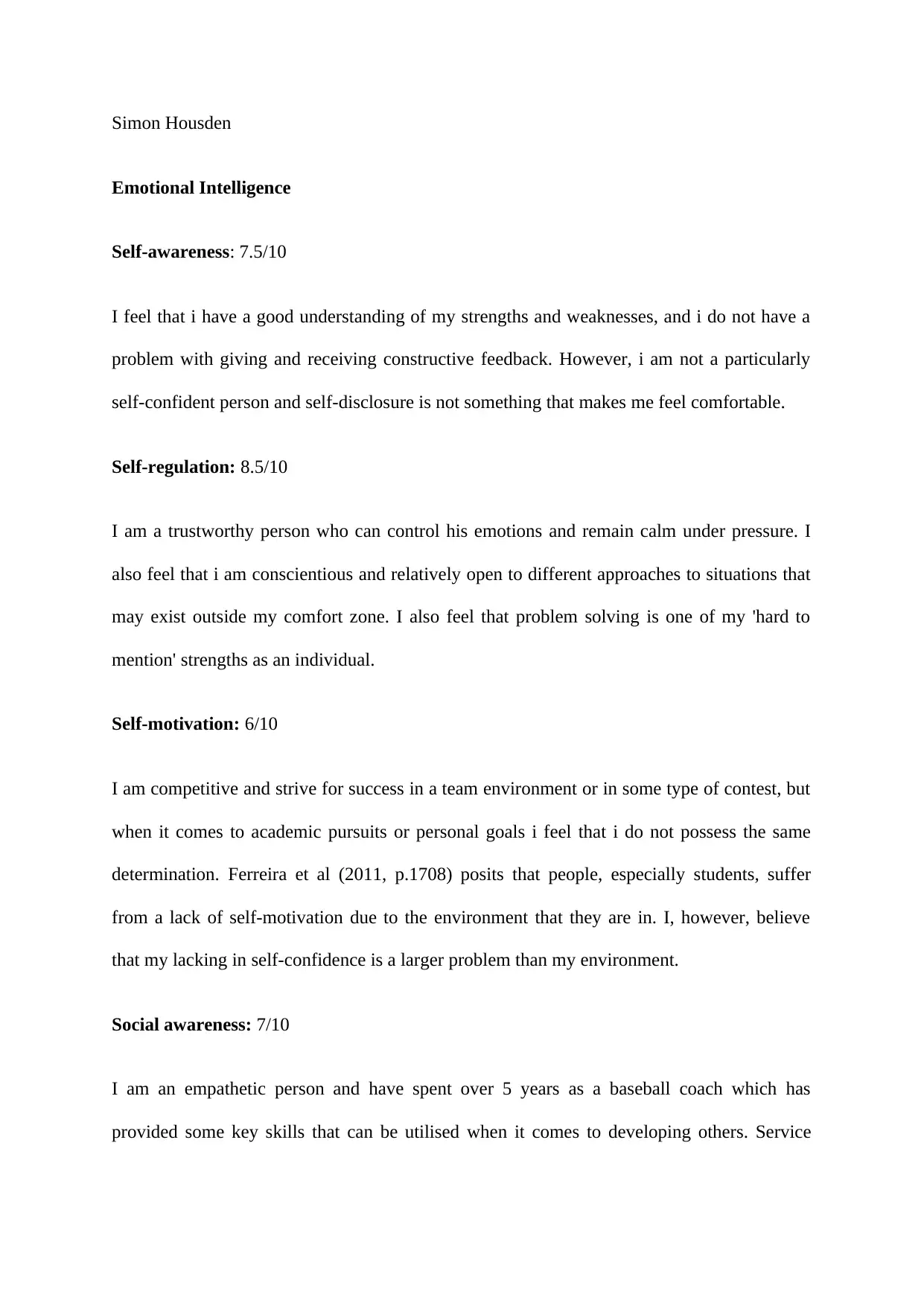
Simon Housden
Emotional Intelligence
Self-awareness: 7.5/10
I feel that i have a good understanding of my strengths and weaknesses, and i do not have a
problem with giving and receiving constructive feedback. However, i am not a particularly
self-confident person and self-disclosure is not something that makes me feel comfortable.
Self-regulation: 8.5/10
I am a trustworthy person who can control his emotions and remain calm under pressure. I
also feel that i am conscientious and relatively open to different approaches to situations that
may exist outside my comfort zone. I also feel that problem solving is one of my 'hard to
mention' strengths as an individual.
Self-motivation: 6/10
I am competitive and strive for success in a team environment or in some type of contest, but
when it comes to academic pursuits or personal goals i feel that i do not possess the same
determination. Ferreira et al (2011, p.1708) posits that people, especially students, suffer
from a lack of self-motivation due to the environment that they are in. I, however, believe
that my lacking in self-confidence is a larger problem than my environment.
Social awareness: 7/10
I am an empathetic person and have spent over 5 years as a baseball coach which has
provided some key skills that can be utilised when it comes to developing others. Service
Emotional Intelligence
Self-awareness: 7.5/10
I feel that i have a good understanding of my strengths and weaknesses, and i do not have a
problem with giving and receiving constructive feedback. However, i am not a particularly
self-confident person and self-disclosure is not something that makes me feel comfortable.
Self-regulation: 8.5/10
I am a trustworthy person who can control his emotions and remain calm under pressure. I
also feel that i am conscientious and relatively open to different approaches to situations that
may exist outside my comfort zone. I also feel that problem solving is one of my 'hard to
mention' strengths as an individual.
Self-motivation: 6/10
I am competitive and strive for success in a team environment or in some type of contest, but
when it comes to academic pursuits or personal goals i feel that i do not possess the same
determination. Ferreira et al (2011, p.1708) posits that people, especially students, suffer
from a lack of self-motivation due to the environment that they are in. I, however, believe
that my lacking in self-confidence is a larger problem than my environment.
Social awareness: 7/10
I am an empathetic person and have spent over 5 years as a baseball coach which has
provided some key skills that can be utilised when it comes to developing others. Service
Paraphrase This Document
Need a fresh take? Get an instant paraphrase of this document with our AI Paraphraser
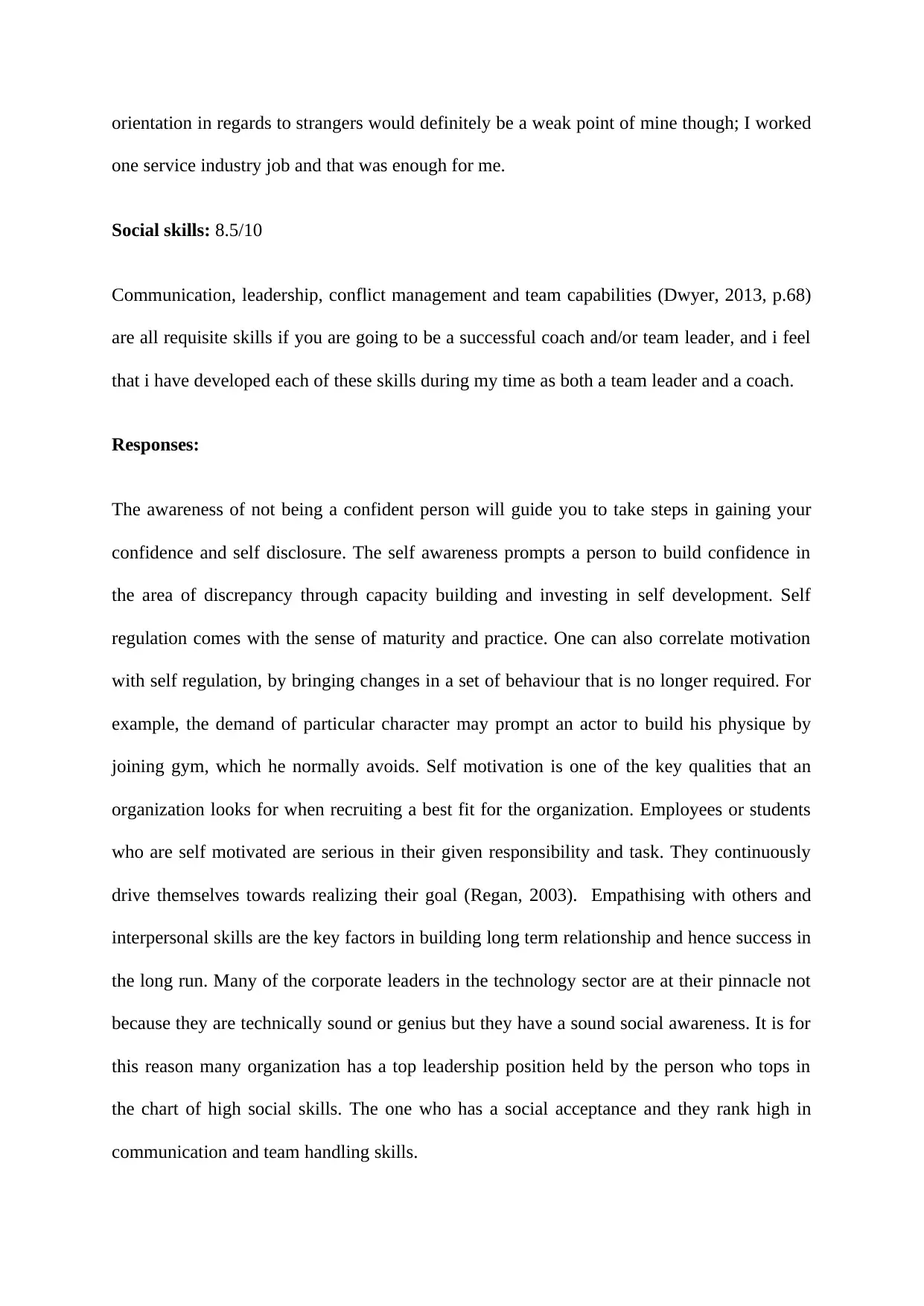
orientation in regards to strangers would definitely be a weak point of mine though; I worked
one service industry job and that was enough for me.
Social skills: 8.5/10
Communication, leadership, conflict management and team capabilities (Dwyer, 2013, p.68)
are all requisite skills if you are going to be a successful coach and/or team leader, and i feel
that i have developed each of these skills during my time as both a team leader and a coach.
Responses:
The awareness of not being a confident person will guide you to take steps in gaining your
confidence and self disclosure. The self awareness prompts a person to build confidence in
the area of discrepancy through capacity building and investing in self development. Self
regulation comes with the sense of maturity and practice. One can also correlate motivation
with self regulation, by bringing changes in a set of behaviour that is no longer required. For
example, the demand of particular character may prompt an actor to build his physique by
joining gym, which he normally avoids. Self motivation is one of the key qualities that an
organization looks for when recruiting a best fit for the organization. Employees or students
who are self motivated are serious in their given responsibility and task. They continuously
drive themselves towards realizing their goal (Regan, 2003). Empathising with others and
interpersonal skills are the key factors in building long term relationship and hence success in
the long run. Many of the corporate leaders in the technology sector are at their pinnacle not
because they are technically sound or genius but they have a sound social awareness. It is for
this reason many organization has a top leadership position held by the person who tops in
the chart of high social skills. The one who has a social acceptance and they rank high in
communication and team handling skills.
one service industry job and that was enough for me.
Social skills: 8.5/10
Communication, leadership, conflict management and team capabilities (Dwyer, 2013, p.68)
are all requisite skills if you are going to be a successful coach and/or team leader, and i feel
that i have developed each of these skills during my time as both a team leader and a coach.
Responses:
The awareness of not being a confident person will guide you to take steps in gaining your
confidence and self disclosure. The self awareness prompts a person to build confidence in
the area of discrepancy through capacity building and investing in self development. Self
regulation comes with the sense of maturity and practice. One can also correlate motivation
with self regulation, by bringing changes in a set of behaviour that is no longer required. For
example, the demand of particular character may prompt an actor to build his physique by
joining gym, which he normally avoids. Self motivation is one of the key qualities that an
organization looks for when recruiting a best fit for the organization. Employees or students
who are self motivated are serious in their given responsibility and task. They continuously
drive themselves towards realizing their goal (Regan, 2003). Empathising with others and
interpersonal skills are the key factors in building long term relationship and hence success in
the long run. Many of the corporate leaders in the technology sector are at their pinnacle not
because they are technically sound or genius but they have a sound social awareness. It is for
this reason many organization has a top leadership position held by the person who tops in
the chart of high social skills. The one who has a social acceptance and they rank high in
communication and team handling skills.
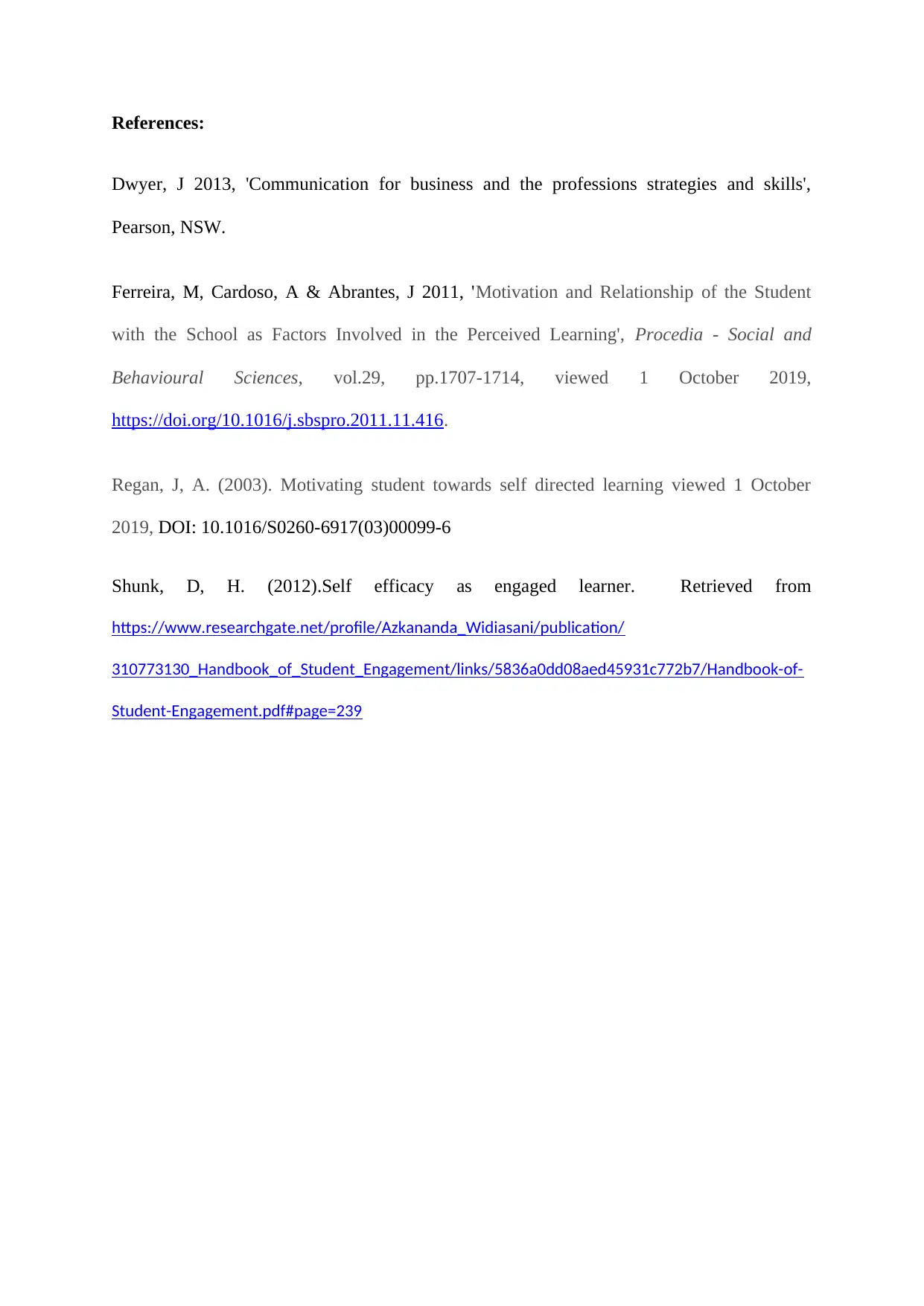
References:
Dwyer, J 2013, 'Communication for business and the professions strategies and skills',
Pearson, NSW.
Ferreira, M, Cardoso, A & Abrantes, J 2011, 'Motivation and Relationship of the Student
with the School as Factors Involved in the Perceived Learning', Procedia - Social and
Behavioural Sciences, vol.29, pp.1707-1714, viewed 1 October 2019,
https://doi.org/10.1016/j.sbspro.2011.11.416.
Regan, J, A. (2003). Motivating student towards self directed learning viewed 1 October
2019, DOI: 10.1016/S0260-6917(03)00099-6
Shunk, D, H. (2012).Self efficacy as engaged learner. Retrieved from
https://www.researchgate.net/profile/Azkananda_Widiasani/publication/
310773130_Handbook_of_Student_Engagement/links/5836a0dd08aed45931c772b7/Handbook-of-
Student-Engagement.pdf#page=239
Dwyer, J 2013, 'Communication for business and the professions strategies and skills',
Pearson, NSW.
Ferreira, M, Cardoso, A & Abrantes, J 2011, 'Motivation and Relationship of the Student
with the School as Factors Involved in the Perceived Learning', Procedia - Social and
Behavioural Sciences, vol.29, pp.1707-1714, viewed 1 October 2019,
https://doi.org/10.1016/j.sbspro.2011.11.416.
Regan, J, A. (2003). Motivating student towards self directed learning viewed 1 October
2019, DOI: 10.1016/S0260-6917(03)00099-6
Shunk, D, H. (2012).Self efficacy as engaged learner. Retrieved from
https://www.researchgate.net/profile/Azkananda_Widiasani/publication/
310773130_Handbook_of_Student_Engagement/links/5836a0dd08aed45931c772b7/Handbook-of-
Student-Engagement.pdf#page=239
You're viewing a preview
Unlock full access by subscribing today!
1 out of 6
Related Documents
Your All-in-One AI-Powered Toolkit for Academic Success.
+13062052269
info@desklib.com
Available 24*7 on WhatsApp / Email
![[object Object]](/_next/static/media/star-bottom.7253800d.svg)
Unlock your academic potential
© 2024 | Zucol Services PVT LTD | All rights reserved.





